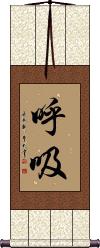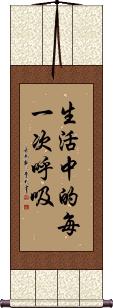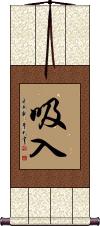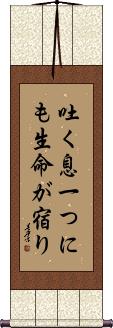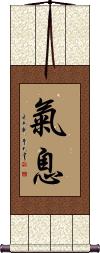Many custom options...
And formats...

Breathe in Chinese / Japanese...
Buy a Breathe calligraphy wall scroll here!
Personalize your custom “Breathe” project by clicking the button next to your favorite “Breathe” title below...
Breathe
呼吸 means to breathe, breathing or breath in Chinese characters, old Korean Hanja, and Japanese Kanji.
These two characters mean to exhale and inhale. Maybe this will remind you to “just breathe.”
Life in Every Breath
生活中的每一次呼吸 means “life in every breath” in Chinese.
This phrase is more like “every breath in life” as if it's a quantity of breaths that makes up your life.
There are many ways to understand this phrase in English, so this is one of a few ways it could be translated into Chinese. If you’re looking for a different meaning, please contact me.
Inhale
吸入 is a Chinese, Japanese, and old Korean word that means inhale, inhalation, or to breathe in.
吸 by itself can mean to inhale or suck in.
入 means to enter (in this case, the body), so it clarifies that this is the true inhalation of air into the body.
If you need a reminder to breathe (slow down and take a deep breath), this may be the word you want hanging on your wall.
Life in Every Breath
吐く息一つにも生命が宿り means “life in every breath” in Japanese.
This phrase is more like “every single breath as you live and dwell.”
The characters breakdown this way:
吐く息 (hakuiki) to breathe; exhaled air; one's breath; breathing.
一つ (hitotsu) one; only; just.
にも (nimo) also; too; as well; even.
生命 (seimei) life; existence; living.
が (ga) particle.
宿り (yadori) to lodge; to dwell; lodging; abode; shelter.
Note: Because this selection contains some special Japanese Hiragana characters, it should be written by a Japanese calligrapher.
Breath of Life
Not the results for breathe that you were looking for?
Below are some entries from our dictionary that may match your breathe search...
| Characters If shown, 2nd row is Simp. Chinese |
Pronunciation Romanization |
Simple Dictionary Definition |
欲 see styles |
yù yu4 yü yoku よく |
to wish for; to desire; variant of 慾|欲[yu4] greed; craving; desire; avarice; wants; (surname) Yoku rājas, passion. Also kāma, desire, love. The Chinese word means to breathe after, aspire to, desire, and is also used as 慾 for lust, passion; it is inter alia intp. as 染愛塵 tainted with the dust (or dirt) of love, or lust. The three desires are for beauty, demeanour, and softness; the five are those of the five physical senses. |
吸入 see styles |
xī rù xi1 ru4 hsi ju kyuunyuu / kyunyu きゅうにゅう |
More info & calligraphy: Inhale(noun, transitive verb) inhalation |
呼吸 see styles |
hū xī hu1 xi1 hu hsi kokyuu / kokyu こきゅう |
More info & calligraphy: Breathe(n,vs,vt,vi) (1) breathing; respiration; (2) knack; trick; secret (of doing something); (3) harmony; balance; synchronization; accord; (4) (See 一呼吸) short interval; short pause Exhale and inhale. |
吸 see styles |
xī xi1 hsi kyū |
to breathe; to suck in; to absorb; to inhale To suck up, inhale. |
呬 see styles |
xì xi4 hsi ki |
to rest to breathe |
呴 see styles |
xū xu1 hsü |
breathe on; yawn; roar |
呵 see styles |
hē he1 ho ka しかり |
(bound form) to scold; to expel breath; (onom.) laughter (usu. reduplicated); interjection of surprise scolding he, ko. Breathe out, yawn, scold; ha, laughter; used for 訶 and 阿. |
呼 see styles |
hū hu1 hu ko こ |
to call; to cry; to shout; to breath out; to exhale (surname) Ko Call; breathe out. |
喣 see styles |
xǔ xu3 hsü |
to breathe upon |
息 see styles |
xī xi1 hsi yasumu やすむ |
breath; news; interest (on an investment or loan); to cease; to stop; to rest; Taiwan pr. [xi2] (form) son; (personal name) Yasumu To breathe; breath; rest, stop, settle, cease; produce, interest. |
欨 see styles |
xū xu1 hsü |
(literary) to blow or breathe upon; happy |
蜃 see styles |
shèn shen4 shen shin |
giant clam; (mythology) clam-monster said to breathe out a vapor that forms a mirage of buildings Mirage; sea-serpent; frog. |
出息 see styles |
chū xi chu1 xi5 ch`u hsi chu hsi shussoku |
future prospects; profit; to mature; to grow up To breathe out. |
出氣 出气 see styles |
chū qì chu1 qi4 ch`u ch`i chu chi |
to vent one's anger; to breathe out; to exhale |
吐く see styles |
haku はく |
(transitive verb) (1) to vomit; to throw up; to spit up; (transitive verb) (2) to emit; to send forth; to breathe out; (transitive verb) (3) to give (an opinion); to make (a comment); to express; to tell; (transitive verb) (4) to confess |
吸う see styles |
suu / su すう |
(transitive verb) (1) to smoke; to breathe in; to inhale; (2) to suck; to sip; to slurp; (3) to absorb; to soak up; (4) to kiss |
吸氧 see styles |
xī yǎng xi1 yang3 hsi yang |
to breathe; to absorb oxygen |
吸進 吸进 see styles |
xī jìn xi1 jin4 hsi chin |
to inhale; to breathe in |
吹く see styles |
fuku ふく |
(v5k,vi) (1) to blow (of the wind); (transitive verb) (2) to blow (one's breath); to breathe out; to blow on (hot tea, candles, etc.); to puff; (transitive verb) (3) to play (a wind instrument); to blow (a whistle, trumpet, etc.); to whistle (a tune); (v5k,vt,vi) (4) (See 噴く) to emit (smoke, fire, etc.); to spout; to spew; to puff out; (v5k,vt,vi) (5) to sprout; to put forth (buds); (v5k,vt,vi) (6) to appear (on the surface); to form; to be coated with (powder, rust, etc.); (v5k,vi) (7) (slang) (See 吹き出す・3) to burst out laughing; to burst into laughter; (transitive verb) (8) to brag; to talk big; (transitive verb) (9) to smelt; to mint |
呼出 see styles |
hū chū hu1 chu1 hu ch`u hu chu yobidashi よびだし |
to exhale; to breathe out; to make an outgoing call; (computing) to bring up (a menu, search bar, virtual keyboard etc) (irregular okurigana usage) (noun/participle) (1) call; summons; paging; curtain call; (2) (sumo) usher who calls the names of wrestlers, sweeps the ring, etc.; (3) (abbreviation) telephone number at which a person without a telephone can be reached; (4) (archaism) box-shaped area containing clean water for rinsing oneself (in an Edo-period bathhouse); (5) (archaism) high-ranking prostitute in the Yoshiwara district (Edo period); (6) (archaism) unlicensed prostitute in the Fukagawa red-light district (Edo period) |
呼氣 呼气 see styles |
hū qì hu1 qi4 hu ch`i hu chi |
to breathe out |
喘ぐ see styles |
aegu あえぐ |
(v5g,vi) (1) to gasp; to pant; to breathe hard; (v5g,vi) (2) to suffer; to struggle |
喘氣 喘气 see styles |
chuǎn qì chuan3 qi4 ch`uan ch`i chuan chi |
to breathe deeply; to pant; to gasp; to take a breather; to catch one's breath |
喫う see styles |
suu / su すう |
(transitive verb) (1) to smoke; to breathe in; to inhale; (2) to suck; to sip; to slurp; (3) to absorb; to soak up; (4) to kiss |
嚥氣 咽气 see styles |
yàn qì yan4 qi4 yen ch`i yen chi |
to die; to breathe one's last |
斷氣 断气 see styles |
duàn qì duan4 qi4 tuan ch`i tuan chi |
to stop breathing; to breathe one's last; to die; to cut the gas supply |
盯住 see styles |
dīng zhù ding1 zhu4 ting chu |
to watch sb closely; to breathe down sb's neck; to mark (sports) |
透氣 透气 see styles |
tòu qì tou4 qi4 t`ou ch`i tou chi |
to flow freely (of air); to ventilate; to breathe (of fabric etc); to take a breath of fresh air; to divulge |
吸込む see styles |
suikomu すいこむ |
(transitive verb) (1) to inhale; to breathe in; to suck up; to imbibe; (2) to absorb; to soak up |
吹込む see styles |
fukikomu ふきこむ |
(v5m,vi,vt) (1) to blow into; to breathe into; (transitive verb) (2) to inspire; to indoctrinate; (3) to record (music, video, etc.) |
Click here for more breathe results from our dictionary
The following table may be helpful for those studying Chinese or Japanese...
| Title | Characters | Romaji (Romanized Japanese) | Various forms of Romanized Chinese | |
| Breathe | 呼吸 | ko kyuu / kokyuu / ko kyu | hū xī / hu1 xi1 / hu xi / huxi | hu hsi / huhsi |
| Life in Every Breath | 生活中的每一次呼吸 | shēng huó zhōng de měi yī cì hū xī sheng1 huo2 zhong1 de mei3 yi1 ci4 hu1 xi1 sheng huo zhong de mei yi ci hu xi | sheng huo chung te mei i tz`u hu hsi sheng huo chung te mei i tzu hu hsi |
|
| Inhale | 吸入 | kyuu nyuu / kyuunyuu / kyu nyu | xī rù / xi1 ru4 / xi ru / xiru | hsi ju / hsiju |
| Life in Every Breath | 吐く息一つにも生命が宿り | hakuiki hitotsu nimo seimei ga yadori | ||
| Breath of Life | 氣息 气息 | kisoku | qì xī / qi4 xi1 / qi xi / qixi | ch`i hsi / chihsi / chi hsi |
| In some entries above you will see that characters have different versions above and below a line. In these cases, the characters above the line are Traditional Chinese, while the ones below are Simplified Chinese. | ||||
Successful Chinese Character and Japanese Kanji calligraphy searches within the last few hours...
